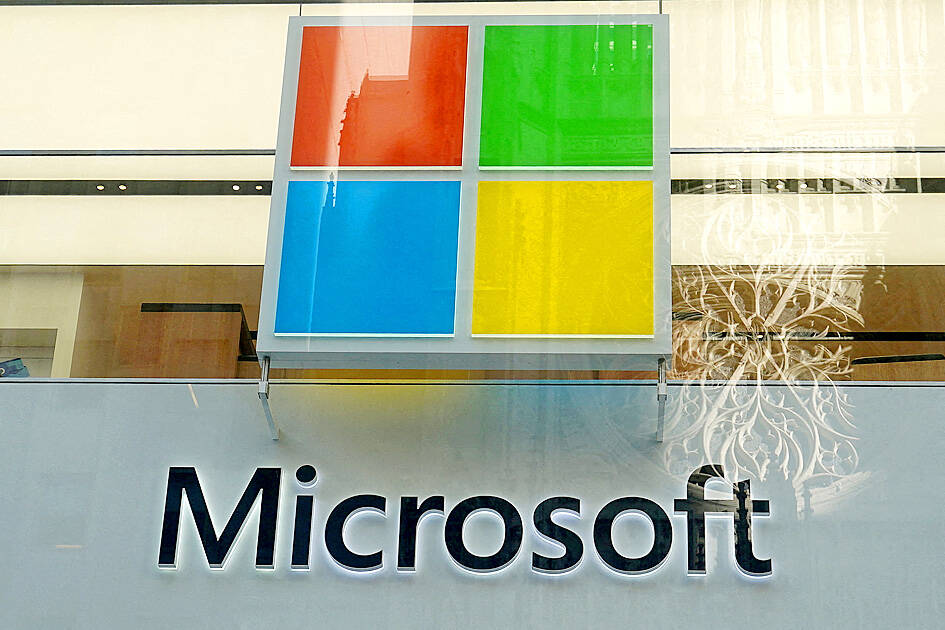Microsoft Corp president Brad Smith on Friday said the company is on track to pump about US$80 billion into artificial intelligence (AI) this fiscal year ending at the close of June.
Smith contended AI is poised to transform all aspects of life, and it is imperative that the US be the global leader when it comes to the technology, he wrote in an online post.
“In many ways, artificial intelligence is the electricity of our age, and the next four years can build a foundation for America’s economic success for the next quarter century,” Smith said.

Photo: Reuters
He called on US president-elect Donald Trump and Congress to expand support for AI innovation with moves such as increased funding for research at universities and the National Science Foundation.
China and the US are racing to spread their AI systems to other countries in an effort to become the de facto standard, Smith said.
“Given the nature of technology markets and their potential network effects, this race between the US and China for international influence likely would be won by the fastest first mover,” Smith said.
“Hence, the United States needs a smart international strategy to rapidly support American AI around the world,” he added.
China has started offering developing countries subsidized access to scarce computer chips and help building local AI datacenters, Smith said.
“The Chinese wisely recognize that if a country standardizes on China’s AI platform, it likely will continue to rely on that platform in the future,” Smith said.
The US should move quickly to promote its AI technology as superior and more trustworthy, enlisting allies in the effort, he said.
For its part, Microsoft is on pace to invest about US$80 billion this year to build out AI datacenters, train AI models and deploy cloud-based applications around the world, Smith said.
Microsoft rivals Amazon.com Inc, Google and OpenAI have also been spending billions of US dollars on AI even, although it remains unclear how and when they expect to profit from those investments.

With an approval rating of just two percent, Peruvian President Dina Boluarte might be the world’s most unpopular leader, according to pollsters. Protests greeted her rise to power 29 months ago, and have marked her entire term — joined by assorted scandals, investigations, controversies and a surge in gang violence. The 63-year-old is the target of a dozen probes, including for her alleged failure to declare gifts of luxury jewels and watches, a scandal inevitably dubbed “Rolexgate.” She is also under the microscope for a two-week undeclared absence for nose surgery — which she insists was medical, not cosmetic — and is

CAUTIOUS RECOVERY: While the manufacturing sector returned to growth amid the US-China trade truce, firms remain wary as uncertainty clouds the outlook, the CIER said The local manufacturing sector returned to expansion last month, as the official purchasing managers’ index (PMI) rose 2.1 points to 51.0, driven by a temporary easing in US-China trade tensions, the Chung-Hua Institution for Economic Research (CIER, 中華經濟研究院) said yesterday. The PMI gauges the health of the manufacturing industry, with readings above 50 indicating expansion and those below 50 signaling contraction. “Firms are not as pessimistic as they were in April, but they remain far from optimistic,” CIER president Lien Hsien-ming (連賢明) said at a news conference. The full impact of US tariff decisions is unlikely to become clear until later this month

GROWING CONCERN: Some senior Trump administration officials opposed the UAE expansion over fears that another TSMC project could jeopardize its US investment Taiwan Semiconductor Manufacturing Co (TSMC, 台積電) is evaluating building an advanced production facility in the United Arab Emirates (UAE) and has discussed the possibility with officials in US President Donald Trump’s administration, people familiar with the matter said, in a potentially major bet on the Middle East that would only come to fruition with Washington’s approval. The company has had multiple meetings in the past few months with US Special Envoy to the Middle East Steve Witkoff and officials from MGX, an influential investment vehicle overseen by the UAE president’s brother, the people said. The conversations are a continuation of talks that

CHIP DUTIES: TSMC said it voiced its concerns to Washington about tariffs, telling the US commerce department that it wants ‘fair treatment’ to protect its competitiveness Taiwan Semiconductor Manufacturing Co (TSMC, 台積電) yesterday reiterated robust business prospects for this year as strong artificial intelligence (AI) chip demand from Nvidia Corp and other customers would absorb the impacts of US tariffs. “The impact of tariffs would be indirect, as the custom tax is the importers’ responsibility, not the exporters,” TSMC chairman and chief executive officer C.C. Wei (魏哲家) said at the chipmaker’s annual shareholders’ meeting in Hsinchu City. TSMC’s business could be affected if people become reluctant to buy electronics due to inflated prices, Wei said. In addition, the chipmaker has voiced its concern to the US Department of Commerce